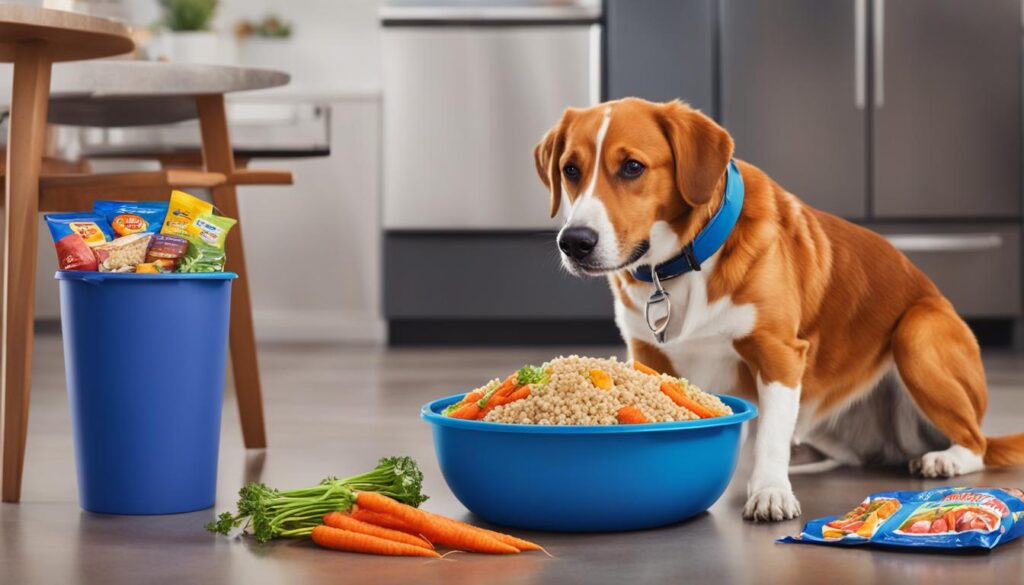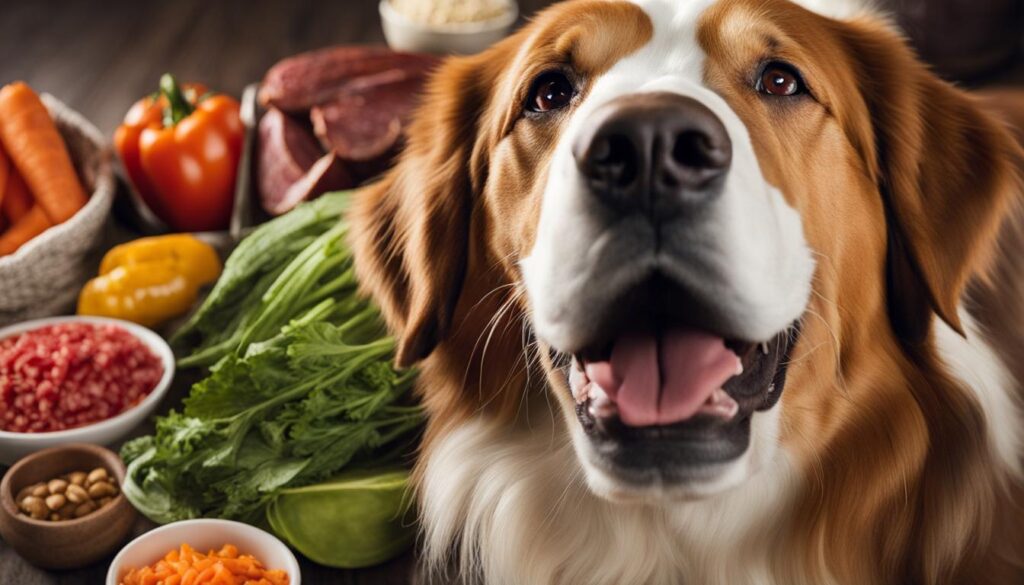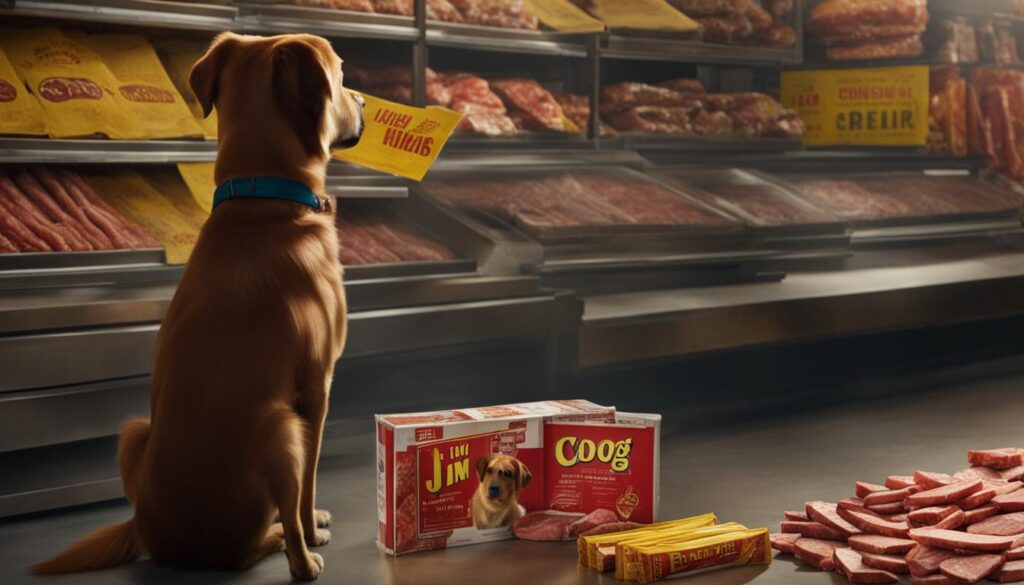As a responsible dog owner, I understand the importance of providing my furry friend with a safe and healthy diet. That’s why I wanted to explore the topic of dogs and Slim Jims. Can dogs indulge in these popular processed meat snacks, or are there potential risks involved? In this article, we will delve into the potential dangers of feeding Slim Jims to dogs and discuss alternative, dog-friendly snacks that promote canine nutrition.
Key Takeaways:
- Feeding Slim Jims to dogs can pose several risks to their health, including dehydration, kidney problems, elevated blood pressure, and digestive issues.
- It is advisable to opt for healthier alternatives, such as natural dog treats or homemade snacks, which provide nutritional benefits without the harmful additives found in processed foods.
- A balanced diet is crucial for dogs, with the right balance of protein, fats, carbohydrates, vitamins, and minerals to support their overall well-being.
- Consulting with a veterinarian is essential to determine the specific dietary needs of your dog, taking factors like age, breed, size, and activity level into consideration.
- Prioritizing your dog’s health and investing in proper nutrition can contribute to their long-term well-being and prevent nutritional deficiencies.
Understanding Canine Nutrition

Before we delve into the specific risks of feeding dogs Slim Jims, it is important to understand the basics of canine nutrition. Dogs, like humans, require a balanced diet that provides them with the necessary nutrients to thrive. A healthy canine diet should include a proper balance of protein, fats, carbohydrates, and essential vitamins and minerals. It is essential to meet these dietary needs to ensure your dog’s overall well-being.
Protein is a crucial component of a dog’s diet as it supports muscle development, repair, and growth. High-quality sources of protein, such as lean meats, poultry, and fish, are ideal for meeting a dog’s protein requirements. These protein sources also provide essential amino acids that are necessary for various body functions.
Fats are another important nutrient for dogs, providing energy and supporting their skin and coat health. Healthy fats, such as those found in salmon or flaxseed oil, are beneficial for dogs and should be included in their diet in appropriate amounts.
Carbohydrates, while not an essential nutrient for dogs, can be a source of energy. Whole grains, such as brown rice and oats, and fiber-rich vegetables like sweet potatoes and green beans, can provide dogs with the necessary carbohydrates for energy and digestion.
In addition to macronutrients, dogs also require various vitamins and minerals for proper body functions. These include vitamins A, B, C, D, E, and K, as well as minerals like calcium, phosphorus, and iron. These nutrients can be obtained through a well-balanced diet that includes a variety of fruits, vegetables, and whole foods.
It is important to note that the specific nutritional requirements of a dog may vary based on factors such as age, size, breed, and activity level. Consulting with a veterinarian can help determine the specific dietary needs of your dog and ensure they are receiving the appropriate nutrients.
Now that we have a better understanding of canine nutrition, we can explore the risks associated with feeding Slim Jims to dogs and discuss healthier alternatives in the next section.
The Risks of Feeding Slim Jims to Dogs

Slim Jims, a popular processed meat snack, may be tempting to share with your furry friend. However, it’s important to understand the potential risks that feeding Slim Jims to dogs can pose to their health.
One of the main concerns is the high sodium content found in Slim Jims. Dogs have different sodium requirements than humans, and excessive sodium intake can lead to dehydration, kidney problems, and elevated blood pressure in dogs.
In addition to the high sodium content, Slim Jims often contain artificial additives. These additives can cause digestive issues in dogs, such as upset stomach, diarrhea, or vomiting. Furthermore, some dogs may be allergic to certain artificial additives, leading to potential allergic reactions.
Feeding Slim Jims to dogs on a regular basis can introduce them to a diet that is high in sodium and artificial additives, which can have negative effects on their overall health and well-being. It is crucial to be aware of these risks and consider healthier alternatives when treating your furry companion.
Healthy Alternatives for Dog-Friendly Snacks
If you’re looking for safe and nutritious treats for your dog, there are plenty of healthier alternatives to Slim Jims. Consider giving them natural dog treats made with wholesome ingredients or homemade dog treats that you can prepare yourself. These options not only provide nutritional benefits but also allow you to have control over the ingredients.
Incorporating fruits and vegetables into your dog’s diet is another great option. Apples, carrots, and green beans can be safe and nutritious snacks for dogs. Just make sure to remove any seeds or pits and properly cut them into small, bite-sized pieces.
Lean meats like chicken or turkey can be another alternative, as long as they are cooked thoroughly and offered in moderation. Avoid seasoning the meat with any substances that may be harmful to dogs, such as garlic or onions.
By opting for these healthier alternatives, you can provide your dog with tasty treats while prioritizing their health and well-being.
Remember, a balanced and nutritious diet is key to maintaining your dog’s optimal health. Consult with your veterinarian to develop a feeding plan that suits your dog’s specific needs and to ensure they are receiving the right balance of nutrients.
Healthier Alternatives for Dog-Friendly Snacks

Feeding Slim Jims to your dog may pose risks to their health, but there are plenty of healthier alternatives available. Instead of processed meat snacks, consider offering your furry friend natural and nutritious dog treats. You can opt for commercially available options that are made with wholesome ingredients and free from harmful additives. Alternatively, you can try making homemade dog treats using simple and safe recipes.
Fruits and vegetables can also be excellent choices for dog-friendly snacks. Apples, carrots, and green beans are all safe and nutritious options that can provide a satisfying crunch for your furry companion. Just be sure to remove any seeds or pits and cut them into bite-sized pieces to avoid choking hazards.
Lean meats, such as cooked chicken or turkey, can also be offered as occasional treats. These protein-rich options can provide a tasty and healthy alternative to processed meat snacks. Just ensure that the meats are cooked thoroughly, free from seasoning or added ingredients that may harm your dog’s health.
When choosing safe human foods for dogs, it’s important to consider their individual dietary requirements and any potential allergies or sensitivities. Consulting with your veterinarian can provide valuable guidance on suitable options for your specific dog.
Healthy Dog Treat Ideas:
- Natural dog treats made with wholesome ingredients
- Homemade dog treats using safe recipes
- Fruits like apples, carrots, and green beans (seedless)
- Lean meats such as cooked chicken or turkey (no seasoning)
Offering these healthier alternatives can give you peace of mind, knowing that you are providing your dog with nutritious and safe treats. Remember, their well-being depends on a balanced and thoughtful diet.
Why Choose Healthy Dog Treats?
“Healthy dog treats provide a great way to reward your furry friend while meeting their nutritional needs. By choosing treats made with wholesome ingredients, you can ensure that your dog receives essential nutrients and avoids unnecessary additives. It’s a win-win for both taste and health!”
Feeding Guidelines for Dogs

When it comes to providing a healthy and balanced diet for your dog, following proper feeding guidelines is crucial. Adequate portion control and understanding your dog’s specific dietary requirements are essential for their overall well-being. To ensure your dog receives the right nutrition, it is recommended to consult with a veterinarian who can guide you based on your dog’s breed, size, age, and activity level.
By working closely with your veterinarian, you can establish appropriate portion sizes, meal frequency, and the right balance of macronutrients for your dog’s diet. Veterinarians are well-informed about the nutritional needs of different breeds and can make tailored recommendations to meet your dog’s specific dietary requirements.
Portion control plays a vital role in managing your dog’s weight. Overfeeding can lead to obesity and related health issues, while underfeeding can result in nutritional deficiencies. By understanding your dog’s individual needs and feeding them accordingly, you can maintain their weight within a healthy range.
Feeding your dog balanced meals is essential for their overall health and vitality. A balanced diet should include high-quality protein, carbohydrates, fats, vitamins, and minerals. These nutrients are necessary to support your dog’s immune system, maintain healthy skin and coat, and promote proper organ function.
Below is a table that provides a general overview of dog feeding guidelines based on weight categories, as recommended by veterinarians:
| Weight Category | Daily Portion Size (Cups/grams) | Meal Frequency |
|---|---|---|
| Small Breed (0-20 lbs) | 0.25 – 1.5 cups (35 – 210 grams) | 2 – 3 meals per day |
| Medium Breed (21-50 lbs) | 1.5 – 3 cups (210 – 420 grams) | 2 meals per day |
| Large Breed (51-90 lbs) | 3 – 4.5 cups (420 – 630 grams) | 2 meals per day |
| Giant Breed (over 90 lbs) | 4.5 – 8 cups (630 – 1120 grams) | 2 meals per day |
Keep in mind that these are general guidelines, and individual dogs may have unique dietary needs. Always consult with your veterinarian to determine the most suitable feeding guidelines for your furry friend.
The Importance of a Balanced Dog Diet

Providing a balanced diet for your dog is crucial for their long-term health and well-being. Dogs require an optimal dog nutrition plan that ensures they receive all the essential nutrients, vitamins, and minerals their bodies need to thrive. A balanced diet not only prevents nutritional deficiencies but also promotes overall vitality and supports their immune system.
Essential Nutrients for Dogs
A balanced dog diet should consist of high-quality protein, healthy fats, carbohydrates, and a variety of vitamins and minerals. Protein plays a vital role in building and repairing tissues, maintaining healthy muscles, and promoting a strong immune system. Healthy fats are a source of energy and help support brain function and a shiny coat. Carbohydrates provide energy and fiber, while vitamins and minerals are essential for various bodily functions.
By providing a balanced diet, you ensure that your dog receives all these essential nutrients in the right proportions to maintain optimal health and prevent nutritional deficiencies.
Long-Term Health for Dogs
A balanced dog diet plays a crucial role in supporting your furry friend’s long-term health. When dogs are consistently fed a balanced diet, they are less likely to develop health issues associated with poor nutrition. Proper nutrition helps prevent obesity, which can lead to joint problems, heart disease, and other chronic conditions.
Additionally, a balanced diet promotes healthy digestion, reduces the risk of gastrointestinal issues, and contributes to a shiny coat and healthy skin. By providing your dog with a balanced and nourishing diet, you are investing in their long-term health and overall well-being.
Preventing Nutritional Deficiencies
A balanced diet is essential for preventing nutritional deficiencies in dogs. Nutritional deficiencies can lead to a range of health problems, including weakened immune function, stunted growth, and poor muscle development. By providing a well-rounded, balanced diet, you ensure that your dog receives all the necessary nutrients they need for their body to function optimally.
It’s important to consult with your veterinarian to determine the specific dietary requirements for your dog’s breed, size, age, and activity level. They can provide you with personalized recommendations and guidance on feeding your dog a nutritionally balanced and complete diet.
Remember, a balanced dog diet is the foundation for good health and longevity. By providing your dog with the essential nutrients they need, you are helping them thrive and enjoy a happy, active life for years to come.
Potential Risks of Processed Meats for Dogs

Slim Jims are not the only processed meat snack that can pose risks to dogs. Processed meats, in general, have been associated with various health problems in both humans and animals. These meats often contain preservatives, additives, and high levels of sodium, which can have detrimental effects on a dog’s health.
High consumption of processed meats has been linked to increased risks of heart disease, obesity, and certain types of cancers in humans. Similarly, when dogs consume processed meats regularly, they may also be susceptible to similar health issues.
“Processed meats are typically high in sodium and can contribute to health problems such as hypertension and kidney issues in dogs. Additionally, additives and preservatives in processed meats may lead to digestive problems and potential allergic reactions.”
While occasional consumption of processed meats may not immediately harm dogs, long-term exposure and excessive intake can lead to health complications. It is essential for dog owners to be aware of the risks associated with processed meats and take precautions to protect their pet’s health.
Alternative Protein Sources for Dogs
Instead of relying on processed meats, dog owners can opt for alternative protein sources that are healthier and more beneficial for their pets. Consider the following options:
- Lean meats: Choose lean cuts of chicken, turkey, or beef as a source of protein. These meats should be cooked thoroughly and served without any seasonings or additives that may be harmful to dogs.
- Fish: Fish such as salmon or sardines are excellent sources of protein and omega-3 fatty acids, which are beneficial for a dog’s overall health.
- Plant-based proteins: Dogs can also obtain protein from plant-based sources such as lentils, quinoa, and chickpeas. These options are especially beneficial for dogs with certain food allergies or sensitivities.
When incorporating alternative protein sources into a dog’s diet, it is important to consult with a veterinarian to ensure the nutritional needs of the dog are being met. A veterinarian can provide guidance on portion sizes and any specific dietary considerations based on the dog’s age, breed, and overall health.
Following Recommended Dog Diet Recommendations
To ensure that your dog is receiving the proper nutrition, it is crucial to follow recommended dog diet recommendations. When it comes to providing the best dietary care for your canine companion, consulting a veterinarian is essential. A veterinarian can evaluate your dog’s specific nutritional needs and create a personalized diet plan tailored to their individual requirements.
Factors such as age, breed, size, activity level, and any existing health conditions should be taken into consideration when developing a diet plan for your dog. By consulting a veterinarian, you can ensure that your dog’s nutritional needs are met and that their diet is designed to support their overall well-being.
Whether you have a puppy, adult dog, or senior canine, a personalized diet plan can help address their specific dietary needs at any stage of life. It can also help prevent potential health issues that may arise from nutrient deficiencies or imbalances. By following the recommendations of a qualified veterinarian, you can provide your dog with a diet that promotes optimal health and longevity.
Remember, dogs are unique individuals, and their dietary requirements may vary. What works for one dog may not be suitable for another. Consulting a veterinarian ensures that the diet plan takes into consideration your dog’s overall health, dietary preferences, and specific nutritional needs.
Benefits of Consulting a Veterinarian for Dog Diet:
- Personalized diet plan for dogs
- Consideration of individual dog’s dietary needs
- Expert guidance on portion control and balanced meals
- Prevention and management of health conditions through nutrition
- Peace of mind knowing your dog’s nutritional needs are met
| Nutritional Needs | Considerations |
|---|---|
| Protein | Adequate protein intake for muscle development and repair. |
| Fat | Healthy fats for energy, hormone production, and nutrient absorption. |
| Carbohydrates | Carbs provide energy and aid in digestion. |
| Vitamins and Minerals | Essential nutrients for overall health and immune function. |
Understanding the Importance of Canine Health and Nutrition
Prioritizing your dog’s health and investing in proper nutrition are essential for their overall well-being. By providing a balanced diet, you are taking preventive measures to ensure they stay healthy and thrive. Regular veterinary check-ups, a balanced diet, and appropriate exercise can contribute to a happy, healthy dog. Remember, their well-being depends on their nutrition and care.
Ensuring that your dog receives the necessary nutrients, vitamins, and minerals is crucial for their optimal health. A well-balanced diet that meets their individual needs promotes a strong immune system, healthy skin and coat, and overall vitality. Investing in their nutrition is an investment in their future.
Preventive care plays a vital role in keeping your dog healthy. Regular check-ups with a veterinarian can help identify any potential health concerns early on, allowing for prompt treatment. Additionally, preventive measures such as vaccinations, parasite control, and routine dental care can help safeguard your dog’s well-being.
Promoting Overall Well-being Through Nutrition
A balanced diet not only supports physical health but also contributes to your dog’s mental and emotional well-being. When they receive the nutrients they need, dogs are more likely to have stable energy levels, improved cognitive function, and a positive mood. Providing them with a nutritious diet can enhance their quality of life and promote overall well-being.
“Investing in your dog’s nutrition is a way of investing in their happiness and longevity.”
By prioritizing canine health and nutrition, you are proactively caring for your dog’s well-being. Consider consulting with a veterinarian or a professional pet nutritionist to develop a personalized diet plan that meets your dog’s specific nutritional requirements.
| Benefits of Prioritizing Canine Health and Nutrition | Actions to Take |
|---|---|
| Improved immune system | Provide a balanced diet rich in essential nutrients. |
| Healthy skin and coat | Incorporate omega-3 fatty acids and lean proteins into their diet. |
| Enhanced energy levels | Ensure they receive adequate carbohydrates and proteins. |
| Optimal cognitive function | Include brain-boosting nutrients such as antioxidants and B vitamins. |
| Strong muscle development | Provide high-quality proteins and regular exercise. |
Investing in your dog’s health and nutrition is a long-term commitment that yields countless benefits. By providing them with a balanced diet, preventive care, and regular veterinary check-ups, you are setting the foundation for a happy and healthy life. Remember, promoting their overall well-being starts with their nutrition.
Wrapping Up
After careful consideration, it is strongly advised to steer clear of feeding Slim Jims to dogs. The potential risks associated with these processed meat snacks outweigh any benefits they may offer. The high sodium content and artificial additives present in Slim Jims can lead to dehydration, kidney problems, elevated blood pressure, digestive issues, and potential allergic reactions in dogs. Therefore, it is crucial to prioritize the importance of proper canine nutrition and opt for healthier alternatives.
When it comes to your furry friend’s well-being, promoting a balanced dog diet is key. Instead of offering Slim Jims, choose healthier dog treats and snacks that provide nutritional benefits. Natural dog treats made with wholesome ingredients or homemade options are great alternatives. Additionally, fruits and vegetables such as apples, carrots, and green beans can serve as safe and nutritious snacks. Lean meats like chicken or turkey can also be offered occasionally.
By understanding the risks associated with Slim Jims and focusing on proper canine nutrition, you can ensure your dog’s overall health and well-being. Consult with your veterinarian to develop a personalized diet plan that meets your dog’s specific needs and follow their recommendations. By investing in your dog’s nutrition and providing them with a balanced diet, you are promoting their long-term health and happiness.
FAQ
Can dogs eat Slim Jims?
It is not recommended to feed Slim Jims to dogs due to the potential risks and unhealthy nature of processed meat snacks.
What is canine nutrition?
Canine nutrition refers to the dietary needs of dogs, including the proper balance of protein, fats, carbohydrates, vitamins, and minerals.
What are the risks of feeding Slim Jims to dogs?
Slim Jims can pose risks to dogs, including dehydration, kidney problems, elevated blood pressure, digestive issues, and potential allergic reactions.
What are healthier alternatives for dog-friendly snacks?
Healthier alternatives for dog-friendly snacks include natural dog treats, homemade dog treats, fruits, vegetables, and lean meats like chicken or turkey.
What are the feeding guidelines for dogs?
Feeding guidelines for dogs include proper portion control, following veterinary recommendations, and considering factors such as breed, size, age, and activity level.
Why is a balanced dog diet important?
A balanced dog diet ensures that dogs receive all the necessary nutrients, vitamins, and minerals their bodies require for optimal health and well-being.
What are the potential risks of processed meats for dogs?
Processed meats can pose risks to dogs due to preservatives, additives, and high sodium content, which may contribute to health problems in dogs.
How should I follow recommended dog diet recommendations?
Consult with a veterinarian to develop a personalized diet plan for your dog based on their specific nutritional needs, considering factors such as age, breed, size, and health conditions.
Why is canine health and nutrition important?
Prioritizing canine health and nutrition is essential for promoting overall well-being, preventing nutritional deficiencies, and supporting a happy, healthy life for dogs.






